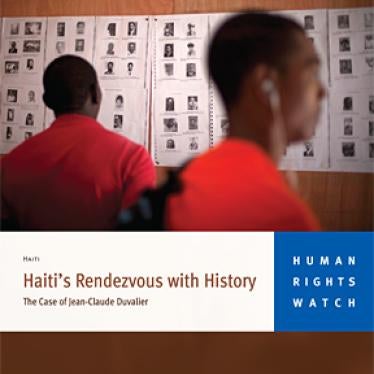(Port-au-Prince) - The prosecution of the former dictator Jean-Claude Duvalier represents a landmark opportunity for the Haitian justice system to address some of the worst crimes in Haiti's past, Human Rights Watch said in a report released today.
The 47-page report, "Haiti's Rendezvous With History: The Case of Jean-Claude Duvalier," examines the legal and practical questions surrounding the case and concludes that Haiti has an obligation under international law to investigate and prosecute the grave violations of human rights under Duvalier's rule. The report also addresses Haiti's capacity to carry out the trial, the question of the statute of limitations, and Duvalier's personal involvement in alleged criminal acts.
"The Duvalier trial could be the most important criminal case in Haitian history," said Reed Brody, counsel for Human Rights Watch. "The challenges for Haiti's weak justice system to carry out a fair trial are enormous, but international support can help Haiti meet those challenges."
Duvalier returned to Haiti on January 16, 2011, after nearly 25 years in exile, and was charged with financial and human rights crimes. The investigation is under way.
Duvalier's rule, from 1971 to 1986, was marked by systematic human rights violations. Hundreds of political prisoners held in a network of prisons known as the "triangle of death" died from mistreatment or were victims of extrajudicial killings. Duvalier's government repeatedly closed independent newspapers and radio stations. Journalists were beaten, in some cases tortured, jailed, and forced to leave the country.
Duvalier could potentially be held liable under Haitian law as an "accomplice" to crimes committed by his subordinates or as a superior who failed to prevent or punish crimes under his command, Human Rights Watch said. These forms of liability were applied by Haitian courts in the prosecution of perpetrators of the April 1994 Raboteau massacre and led to the conviction, later overturned, of a number of superiors, including Raoul Cédras, the leader of the military junta that ruled Haiti from 1991 to 1994.
In one case examined by Human Rights Watch, over 100 Haitian journalists and activists were arrested on November 28, 1980. Several were tortured and many were expelled from Haiti. The Port-au-Prince police chief later said that Duvalier told him to "do what you want with these journalists," while Duvalier himself told the New York Times that, "We were obliged to act" to stop a conspiracy against the government.
Human Rights Watch said that the statute of limitations could not be invoked to stop an investigation. It noted that the Inter-American Court of Human Rights, a body by whose judgments Haiti is legally bound, has held repeatedly that in light of states' obligations to investigate and prosecute serious violations under the American Convention on Human Rights, statutes of limitations are inapplicable in connection with gross human rights violations proscribed by international law. In addition, for the many cases of "disappearances" committed under Duvalier, the statute of limitations would not begin to run until the victims' whereabouts were clarified.
The investigation and trial of a former head of state for mass crimes committed between 25 and 40 years ago will be a complex endeavour, further complicated by the weakness of the Haitian judicial system, Human Rights Watch said. The Haitian government should maximize limited resources by targeting key incidents under Duvalier, Human Rights Watch said, and other governments and international organizations should support Haiti's effort with expert technical assistance.
"A fair trial for Duvalier could mark a break with the impunity that has characterized Haiti's past," Brody said. "International assistance can make the difference in whether this trial happens."







